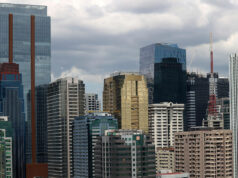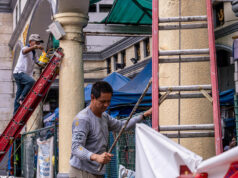HABI Connects collaborates with Bayo
PRIOR to the pandemic, the Philippine weaving industry had been dealing with a number of problems including supply chain issues, lack of credit and funding facilities, and the price and supply of cotton. While a renewed interest in Philippine textiles has emerged over the past year, brought about by the trend of using locally made face masks and clothing made of indigenous weaves, the revival and sustainability of the Philippine weaving industry continues to be a challenge. In its efforts to confront these challenges, HABI: The Philippine Textile Council started the HABI Connects campaign, and through it, now has a collaboration with Filipino fashion brand Bayo.
Since 2009, HABI: The Philippine Textile Council has held the Likhang HABI Market Fair. In 2020, since it was not able to hold a physical fair due to the COVID-19 quarantines, the fair went online through the Shop Habi Fair website (www.shophabifair.com) in an effort to reach customers.
“Rather than disappoint the weavers and vendors who needed to earn, HABI opted to go online. We also wanted to keep our regular customers and supporters happy by giving them the opportunity to shop,” HABI President Adelaida Lim said in an e-mail to BusinessWorld.
This year, HABI launches the campaign HABI Connects, “to encourage more entrepreneurs, micro, small and medium enterprises (MSMEs), and big businesses, both local and foreign, to support the Philippine weaving industry,” said a press release from the organization.
The HABI Connects campaign begins with a collaboration with Filipino fashion brand Bayo.
The collection features designs made from natural fiber textiles — cotton, abaca, and piña — from La Herminia in Aklan, the Ambension weavers in Bulacan, and the Argao weavers in Cebu. It also showcases weaves made of cotton thread and scrap polyester, “to upcycle industry scraps or production offcuts and avert them from ending up in landfills,” said a press release.
“With quarantines all over the world prohibiting the gathering of crowds, artisans are going online independently or in groups to market their crafted products,” Ms. Lim said. “Much of the offerings are one-of-a-kind and even made to order. Apparently, eco-friendly merchandise or green products have a huge market share that is spread all over the world.”
“While HABI never insisted on exclusivity, we learned, during the pandemic, to be inclusive and to work collaboratively. More things are accomplished in connection with others,” she said.
The collection is now available at www.bayo.com.ph and at www.shophabifair.com. To connect with more HABI weaving communities, e-mail likhanghabi@gmail.com or connect with HABI on Instagram @habifair or www.facebook.com/HABIPhilippineTextileCouncil. — Michelle Anne P. Soliman



